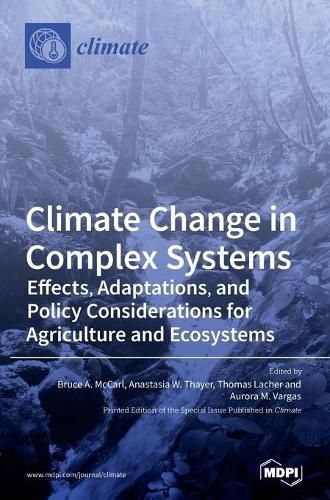Readings Newsletter
Become a Readings Member to make your shopping experience even easier.
Sign in or sign up for free!
You’re not far away from qualifying for FREE standard shipping within Australia
You’ve qualified for FREE standard shipping within Australia
The cart is loading…






This title is printed to order. This book may have been self-published. If so, we cannot guarantee the quality of the content. In the main most books will have gone through the editing process however some may not. We therefore suggest that you be aware of this before ordering this book. If in doubt check either the author or publisher’s details as we are unable to accept any returns unless they are faulty. Please contact us if you have any questions.
Climate change is altering agricultural production and ecosystems around the world. Future projections indicate that additional change is expected in the coming decades, forcing individuals and communities to respond and adapt. Frequently, agriculture and ecosystems are seen as separate entities, resulting in entity-specific solutions in response to threats. Anthropogenic climate change simultaneously stresses both agriculture and ecosystems (AE) along with their interactions, and current research efforts examining climate change effects and possible adaptations fail to integrate agriculture and ecosystems. Research has quantified many AE impacts of climate change, and yet greater impacts are anticipated as climate change proceeds. Thus, an understanding of the implications for changing AE systems is crucial. AE function, health and productivity depend heavily on climatic characteristics. Failure to jointly consider these systems and the associated externalities may underestimate the impacts of climate change or cause adaptation implementation surprises such as the worsening of the adaptation status of some groups or ecosystems. This collection of papers draws on specific studies to explain why ecosystem and agriculture adaptation requires an integrated analytical approach. A synthesis of current literature is used, as well as examples from around the world to help explain concepts and current challenges. Researchers are encouraged to adopt integrated modeling as a means of avoiding implementation challenges and surprises when formulating and implementing adaptations. Failure to incorporate the overlapping effects of agriculture and ecosystems could lead to maladaptation and greater long-term damage under climate change. The papers in this volume address several aspects of these challenges.
$9.00 standard shipping within Australia
FREE standard shipping within Australia for orders over $100.00
Express & International shipping calculated at checkout
This title is printed to order. This book may have been self-published. If so, we cannot guarantee the quality of the content. In the main most books will have gone through the editing process however some may not. We therefore suggest that you be aware of this before ordering this book. If in doubt check either the author or publisher’s details as we are unable to accept any returns unless they are faulty. Please contact us if you have any questions.
Climate change is altering agricultural production and ecosystems around the world. Future projections indicate that additional change is expected in the coming decades, forcing individuals and communities to respond and adapt. Frequently, agriculture and ecosystems are seen as separate entities, resulting in entity-specific solutions in response to threats. Anthropogenic climate change simultaneously stresses both agriculture and ecosystems (AE) along with their interactions, and current research efforts examining climate change effects and possible adaptations fail to integrate agriculture and ecosystems. Research has quantified many AE impacts of climate change, and yet greater impacts are anticipated as climate change proceeds. Thus, an understanding of the implications for changing AE systems is crucial. AE function, health and productivity depend heavily on climatic characteristics. Failure to jointly consider these systems and the associated externalities may underestimate the impacts of climate change or cause adaptation implementation surprises such as the worsening of the adaptation status of some groups or ecosystems. This collection of papers draws on specific studies to explain why ecosystem and agriculture adaptation requires an integrated analytical approach. A synthesis of current literature is used, as well as examples from around the world to help explain concepts and current challenges. Researchers are encouraged to adopt integrated modeling as a means of avoiding implementation challenges and surprises when formulating and implementing adaptations. Failure to incorporate the overlapping effects of agriculture and ecosystems could lead to maladaptation and greater long-term damage under climate change. The papers in this volume address several aspects of these challenges.